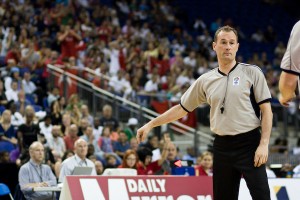If you’re an American playing professional basketball overseas, odds are favorable that you’ll get called for a travel on your first spin move. To label the officiating overseas as ‘different’ would be the understatement of the year.

It’s common to commit the same turnovers during one’s first handful of games and think it’s poor officiating. Later, however, one will realize it’s not poor reffing, but a consistent, unique style of play where the player, not the ref, must make changes. Overseas ball players have no choice but to make adjustments if they hope to devoid themselves of dissatisfaction (and a feeling of distaste toward the game’s authority figures).
The FIBA style isn’t an alienation to the game of basketball. In fact, it can be the purest form of the sport, but it certainly feels foreign to players who first step on the hardwood on faraway lands. The overseas game is a fast-paced, up-and-down style of play, and it makes for great basketball. Because, however, there is an uptempo feel to the games, it’s hard not to notice when that tempo is hampered by the sound of a whistle.
Many times, the sound of the whistle comes in concert with a seemingly new rule unbeknown to American players, who have no choice but to learn on the fly. It was overseas when I first got a technical for looking away from the officials and smiling after a call. It was overseas where the ref first blew the whistle dead because my shoes were too sweaty. It was overseas where my spin moves became travels, my blocks became charges, and my charg es became blocks. It was overseas when the same leg sleeves I wore every game suddenly became illegal overnight.
es became blocks. It was overseas when the same leg sleeves I wore every game suddenly became illegal overnight.
 es became blocks. It was overseas when the same leg sleeves I wore every game suddenly became illegal overnight.
es became blocks. It was overseas when the same leg sleeves I wore every game suddenly became illegal overnight.
Where was it when my teammates got singled out by officials for having fingernails too long and game shorts also too long? Yes, that was overseas too.
The style of officiating beyond North America truly is unique, or ineffable to some. It’s not better or worse (because NBA and NBL officials have issues of their own, such as the overstimulation of the flagrant, hand check, and technical fouls) but simultaneously particular and unpredictable. Players directly affected by such calls are doomed if not intentional about how to manage their habitual reactions. Physical adjustments are necessary, but mental adjustments prove vital. If a player allows phantom calls to create frustration, it will never end. When a call creates confusion, a player who laughs it off has found success.
Always laugh it off.
No comments:
Post a Comment